
"If You Asked Me To" is a song written by American songwriter Diane Warren and produced by Stewart Levine and Aaron Zigman. It was originally recorded by American singer Patti LaBelle for her ninth studio album, Be Yourself (1989), and also for the soundtrack to the James Bond film Licence to Kill. The song was released as the soundtrack's second single on June 12, 1989 by MCA Records. The lyrics are from the point of view of a woman who pleads to her significant other: "If you asked me to, I just might change my mind, and let you in my life forever". Three years later, Canadian singer Celine Dion covered the song for her 1992 self-titled second English-language studio album. Released as the album's second single, Dion's version topped the Canadian charts and peaked at number four on the US Billboard Hot 100.
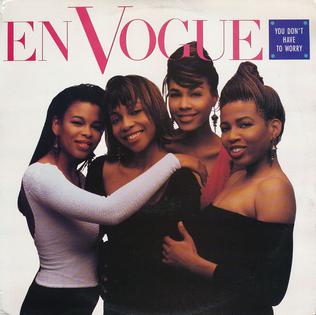
"You Don't Have to Worry" is a song by American girl group En Vogue from their debut album, Born to Sing (1990). The song was released as the third single from the album on October 31, 1990, and was the group's third consecutive number-one single on the Billboard Hot R&B/Hip-Hop Songs chart.

"Something He Can Feel" is a song composed by Curtis Mayfield for the 1976 motion picture Sparkle. The song, a love ballad in a Chicago-/Philly-soul style, became a number-one hit on the Billboard's R&B singles chart in the United States twice with two separate recordings: a 1976 version by Aretha Franklin from the film's soundtrack, and a 1992 cover by girl group En Vogue.
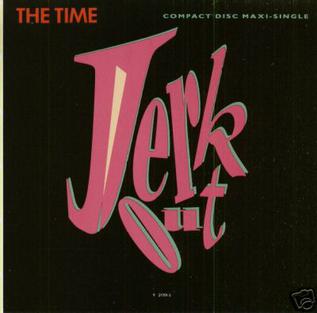
"Jerk Out" is a song from The Time's 1990 album Pandemonium. The song was originally recorded in December 1981 by Prince at his home studio during sessions for What Time Is It?. Prince originally performed all instruments and vocals and this recording remains unreleased. Prince reworked the song in the spring of 1985 for the band Mazarati. The song was ultimately left off the Mazarati album, though circulates among collectors. Again, the song was reworked in late 1989 for inclusion on Pandemonium and contains input by the band. Prince and Mazarati member Bruce DeShazer's backing vocals remain on the finished track.
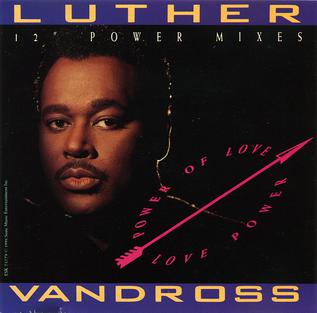
"Power of Love/Love Power" is a single by American singer-songwriter Luther Vandross. It was released on April 9, 1991 as the lead single from his 1991 album of the same name. The song spent two weeks at number one on the US R&B chart, and peaked at number four on the US pop chart, becoming his biggest pop solo hit.

"Superwoman" is a song by R&B singer Karyn White, released as the second single from her self-titled debut album in January 1989. It was her second U.S. top ten hit, peaking at number eight, and her second U.S. R&B number-one hit, holding that position for three weeks. It also earned a gold certification from the Recording Industry Association of America (RIAA).

"I'll Be Good to You" is a 1976 hit song by R&B duo the Brothers Johnson. George Johnson, one of the two Johnson brothers in the band, wrote the song after deciding to commit to a relationship with one woman, instead of dating several at a time. While George was recording a demo for the song, family friend Senora Sam came by and added some lyrics. Brothers Johnson producer and mentor Quincy Jones heard the song, liked it, and convinced George to sing lead on the finished track. Released from their debut album, Look Out for #1, it was a top-ten hit on the Billboard Hot Singles Charts, peaking at number three, and a number one song on the Billboard R&B Charts during the summer of 1976. The single was later certified gold by the RIAA.

"Love Ballad" is a song by R&B/Funk band L.T.D. Jeffrey Osborne is the lead singer.
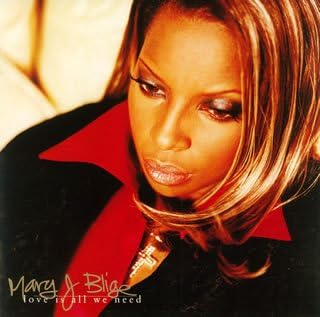
"Love Is All We Need" is a song by American singer Mary J. Blige, with a guest rap from Nas. It was written by Blige, Nas, James Harris III, and Terry Lewis for Blige's third studio album, Share My World (1997), while production was helmed by Jimmy Jam & Terry Lewis. The song contains a sample of the song "Moonchild" (1985) as performed by American singer Rick James. With its more buoyant tone, it stood in conspicuous contrast to much of the more dark-rooted material featured on Blige's earlier albums.

"All This Love" is a single by DeBarge, released on October 17, 1982. The song was released as the third and final single from their second studio album of the same title on the Gordy label. The single would help DeBarge rise to R&B stardom. A cover version of the song was recorded by Patti LaBelle on her 1994 gold album Gems. A video for her version was also filmed.
"634-5789 " is a soul song written by Eddie Floyd and Steve Cropper. It was first recorded by Wilson Pickett on December 20, 1965 and included on his 1966 Atlantic Records album The Exciting Wilson Pickett with backing vocals by Patti LaBelle and the Blue Belles. The single reached number 1 on the Billboard Hot Rhythm & Blues Singles chart and number 13 on the Hot 100 singles chart.

"Fake" is a song written by Jimmy Jam and Terry Lewis and recorded by American recording artist Alexander O'Neal. It is the first single from the O'Neal's second studio album, Hearsay (1987). It is one of the artist's most recognizable signature songs, and a favorite of many O'Neal fans worldwide.
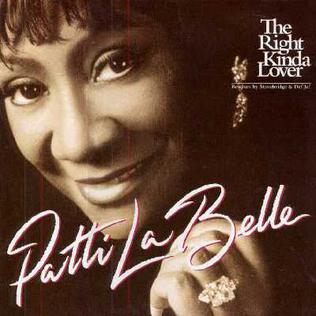
"The Right Kinda Lover" is a song by American singer and actress Patti LaBelle. It was written by Ann Bennett-Nesby, James Harris III, Terry Lewis, and James "Big Jim" Wright, while production was helmed by Jimmy Jam and Terry Lewis, with Wright as co-producing. The song was released as the first single from her LaBelle's 12th album, Gems (1994), and appeared on the soundtrack to the 1994 film Beverly Hills Cop III, starring Eddie Murphy.

Flame is the thirteenth studio album by American singer Patti LaBelle. It was released by MCA Records on June 24, 1997, in the United States.

"Love Will Conquer All" is a track from Lionel Richie's 1986 album Dancing on the Ceiling featuring Marva King on backing vocals. The song was written by Richie along with Greg Phillinganes and Cynthia Weil. "Love Will Conquer All" was Richie's tenth number one on the Adult Contemporary chart. The single spent two weeks at number one and peaked at number nine on the Billboard Hot 100. "Love Will Conquer All" also went to number two for two weeks on the soul chart, behind "Tasty Love" by Freddie Jackson.

"Sometimes It's Only Love" is a 1991 song by American recording artist Luther Vandross. The single was released in 1992 in support of his album Power of Love. The song was a top ten hit on the Billboard's Hot R&B Singles and Hot Adult Contemporary Tracks.
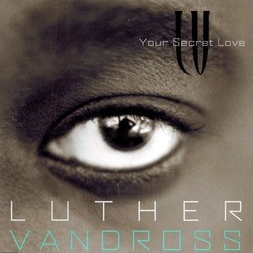
"Your Secret Love" is a song by American recording artist Luther Vandross, released in August 1996 as the lead single in support of his tenth studio album, Your Secret Love (1996). The single peaked at No. 5 on the US Billboard Hot R&B Singles chart and No. 14 on the UK Singles Chart.

"Every Year, Every Christmas" is a song by American singer Luther Vandross. It was written by Vandross and Richard Marx for his tenth studio album, the holiday album This Is Christmas (1995), while production was helmed by Vandross. The original Christmas song received moderate rotation on radio and peaked at number 32 on the US Billboard R&B/Hip-Hop Airplay chart. Singer Patti LaBelle also covered the song, which appeared on her 2007 Christmas album Miss Patti's Christmas. The LaBelle version was spoken at the end the song dedicated to Vandross.

"Love You All My Lifetime" is a 1992 song performed by American singer-songwriter Chaka Khan. Written by the songwriting duo of Klarmann/Weber, it was the first track released off of Chaka Khan's The Woman I Am album. "Love You All My Lifetime" was produced by David Gamson and was Chaka Khan's fifth number-one on the US dance chart. On other US charts, the single went to #2 on the soul singles chart and #68 on the Hot 100. Overseas, "Love You All My Lifetime", went to #49 in the UK.
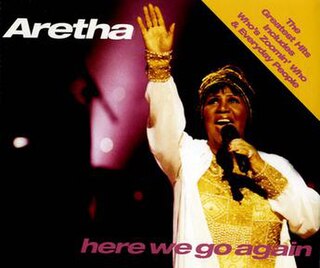
"Here We Go Again" is a song by American singer and songwriter Aretha Franklin. It was written by Trina Broussard, Jermaine Dupri and Trey Lorenz for Franklin's thirty-fourth studio album, A Rose Is Still a Rose (1998), while production was helmed by Dupri and Manuel Seal. The song is built around replayed portions of "The Glow of Love" (1980) by Italian-American post-disco group Change. Due to the inclusion of the sample, Mauro Malavasi, David Romani and Wayne K. Garfield are also credited as songwriters. The song was the second single released from A Rose Is Still a Rose in June 1998 and reached number 76 on the Billboard Hot 100, also becoming Franklin's fifth number one on the US Dance Club Songs.



















